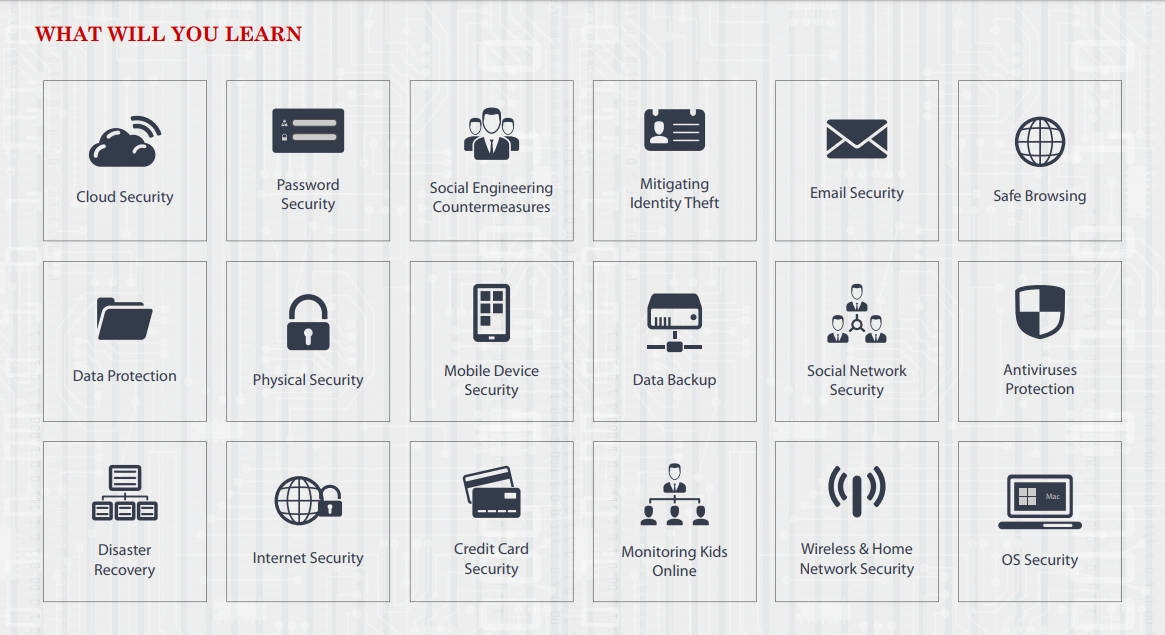- March 27, 2018
- Posted by: SouTech Team
- Category: Blog, CEH, CISSP, Cyber-security and Ethical Hacking Training

About the Program
As “a picture tells a thousand words”, our developers have all this and more for you in over 1685 graphically rich, specially designed slides to help you grasp complex security concepts in depth which will be presented to you in a 5 day hands on class by our Certified EC-Council Instructor.
| Want to start an eBusiness and Grow it Globally with free IT, Legal, Internet Discounts,3 Months SME Startup Course, ePayment Integration, Biz Development Services, Free Website, Free SMS Units/Portal all done for you within 30 Days?
Start Here>> Click >>> Start a Digital Business in Nigeria
The goal of this course is to help you master an ethical hacking methodology that can be used in a penetration testing or ethical hacking situation. You walk out the door with ethical hacking skills that are highly in demand, as well as the internationally recognized Certified Ethical Hacker certification! This course prepares you for EC-Council Certified Ethical Hacker exam 312-50.
- Establish and govern minimum standards for credentialing professional information security specialists in ethical hacking measures.
- Inform the public that credentialed individuals meet or exceed the minimum standards.
- Reinforce ethical hacking as a unique and self-regulating profession.
Who Should Attend?
- Computer Forensics/Digital Forensics Professionals
- Incident Response Personnel
- Military Personnel
- Information Security Professionals
- IT Managers
- Law Enforcement Personnel
- Legal Professionals
- Network Administrators and Architects
- System Administrators
Job Roles after taking the course
- Security Analyst
- Security Operations Center (SOC) Analyst
- Vulnerability Analyst
- Cybersecurity Specialist
- Threat Intelligence Analyst
- Security Engineer
About the Exam
- Number of Questions: 125
- Test Duration: 4 Hours
- Test Format: Multiple Choice
- Test Delivery: ECC EXAM, VUE
- Exam Prefix: 312-50 (ECC EXAM), 312-50 (VUE)
What is New in CEH Version 10 Course
Module 01: Introduction to Ethical Hacking
Module 02: Footprinting and Reconnaissance
Module 03: Scanning Networks
Module 04: Enumeration
Module 05: Vulnerability Analysis
Module 06: System Hacking
Module 07: Malware Threats
Module 08: Sniffing
Module 09: Social Engineering
Module 10: Denial-of-Service
Module 11: Session Hijacking
Module 12: Evading IDS, Firewalls, and Honeypots
Module 13: Hacking Web Servers
Module 14: Hacking Web Applications
Module 15: SQL Injection
Module 16: Hacking Wireless Networks
Module 17: Hacking Mobile Platforms
Module 18: IoT Hacking
Module 19: Cloud Computing
Module 20: Cryptography
What will you learn?
1. Key issues plaguing the information security world, incident management process, and
penetration testing.
2. Various types of footprinting, footprinting tools, and countermeasures.
3. Network scanning techniques and scanning countermeasures.
4. Enumeration techniques and enumeration countermeasures.
5. System hacking methodology, steganography, steganalysis attacks, and covering tracks.
6. Different types of Trojans, Trojan analysis, and Trojan countermeasures.
7. Working of viruses, virus analysis, computer worms, malware analysis procedure, and
countermeasures.
8. Packet sniffing techniques and how to defend against sniffing.
9. Social Engineering techniques, identify theft, and social engineering countermeasures.
10. DoS/DDoS attack techniques, botnets, DDoS attack tools, and DoS/DDoS countermeasures.
11. Session hijacking techniques and countermeasures.
12. Different types of web server attacks, attack methodology, and countermeasures.
13. Different types of web application attacks, web application hacking methodology, and
countermeasures.
14. SQL injection attacks and injection detection tools.
15. Wireless Encryption, wireless hacking methodology, wireless hacking tools, and Wi-Fi security
tools.
16. Mobile platform attack vector, android vulnerabilities, mobile security guidelines, and tools.
17. Firewall, IDS and honeypot evasion techniques, evasion tools, and countermeasures.
18. Various cloud computing concepts, threats, attacks, and security techniques and tools.
19. Different types of cryptography ciphers, Public Key Infrastructure (PKI), cryptography attacks,
and cryptanalysis tools.
20. Various types of penetration testing, security audit, vulnerability assessment, and penetration
testing roadmap.
21. Perform vulnerability analysis to identify security loopholes in the target organization’s
network, communication infrastructure, and end systems.
22. Different threats to IoT platforms and learn how to defend IoT devices securely
What is the employment value of CEH?
The ANSI accredited Ethical Hacking program is primarily targeted at security professionals who want to acquire a well-rounded body of knowledge to have better opportunities in this field. Acquiring a Certified Ethical Hacking Certification means the candidate has a minimum baseline knowledge of security threats, risks and countermeasures. Organizations can rest assured that they have a candidate who is more than a systems administrator, a security auditor, a hacking tool analyst or a vulnerability tester. The candidate is assured of having both business and technical knowledge.
COURSE FEE: N70,000( Nigerian Naira) or $300( USD) * Discounted Pricing
ONLINE CLASS FEE: N50,000( Nigerian Naira) or $100( USD) * Discounted Pricing
Regular Pricing- N100,000
Contact us to claim discount.
COURSE DURATION: 5 Days Intensive(10am-5pm)
TO ATTEND PAY AMOUNT
Account Details
DIAMOND BANK
SOUTECH VENTURES
0054227379
To PAY with your Debit card- CLICK HERE
*Please remember to notify us after successful payment or sending a payment notification directly to this email address: [email protected], 08034121380 ,
Venue: SOUTECH VENTURES, Kano Street, along Shehu Shagari Mosque, Area 1, Abuja, Nigeria
HIGHLIGHTS
- Real-life application and understanding
- Conducive learning environment
- Participants get a Certificate of Training
- Restricted and interactive classes
- Service comes with all necessary softwares
- Soft copy training(Videos and eBooks) materials will be available
- Qualified and experienced facilitators
- Get a full Video/Audio recording of the training (No need for refresher class)
- Full certification course (Good for your CV)
- Customized soft copy of training materials will be provided
- Organized and efficient training process
- Tea/Cofee Breaks to be provided
- Conducive air conditioned learning environment and Parking Space
DONT Miss this opportunity!
-
 10
10 -
 10
10 -
 10
10 -
 10
10 -
 10
10 -
 10
10 -
 10
10 -
 10
10 -
 10
10 -
 10
10 -
 10
10 -
 10
10 -
 10
10 -
 10
10 -
 10
10 -
 10
10 -
 10
10 -
 10
10 -
 10
10 -
 10
10 -
 10
10 -
 10
10 -
 10
10 -
 10
10 -
 10
10 -
 10
10 -
 10
10 -
 10
10
| Want to start an eBusiness and Grow it Globally with free IT, Legal, Internet Discounts,3 Months SME Startup Course, ePayment Integration, Biz Development Services, Free Website, Free SMS Units/Portal all done for you within 30 Days?
Start Here>> Click >>> Start a Digital Business in Nigeria
Related posts:
 Certified Ethical Hacking Certification training center in Abuja Nigeria- Live class and online training
Certified Ethical Hacking Certification training center in Abuja Nigeria- Live class and online training
 Hacking Mobile Platforms: Ethical Hacking Training in Abuja, Lagos, Nigeria
Hacking Mobile Platforms: Ethical Hacking Training in Abuja, Lagos, Nigeria
 Certified Secure Computer User – CSCU EC Council Certification Training Program
Certified Secure Computer User – CSCU EC Council Certification Training Program
 Penetration Testing Training in Nigeria(Certified Ethical Hacking, Certified Penetration Tester,Certified Expert Penetration Tester and the Metasploit Pro Certified Specialist )
Penetration Testing Training in Nigeria(Certified Ethical Hacking, Certified Penetration Tester,Certified Expert Penetration Tester and the Metasploit Pro Certified Specialist )
 Certified Ethical Hacking Comprehensive Training in Abuja + Online Class
Certified Ethical Hacking Comprehensive Training in Abuja + Online Class
